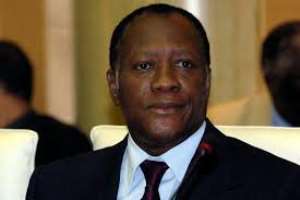
Research and education think tank, Africa Center for International Law and Accountability (ACILA) has welcomed President Alassane Ouattara's decision not to refer cases involving Ivorian citizens to the International Criminal Court (ICC) for prosecution, but urged him to prosecute pro-Ouattara forces for their role in the post-electoral violence which claimed more than 3,000 lives.
In a statement, the Ghana branch of ACILA said that Ivorian Commissions of Inquiry and human rights organizations concluded that both pro-Ouattara and pro-Gbagbo forces allegedly committed international crimes, noting that all sides in the 2010-2011 post-electoral violence must be brought to justice.
“It is regrettable that so far the prosecutions at the ICC and in Ivory Coast have focused only on pro-Gbagbo forces and have not brought any of the pro-Ouattara forces to justice”, ACILA-Ghana noted.
Speaking during a meeting with French President Francois Hollande in Paris last week, Ouattara announced that he would not refer cases to the ICC because Ivory Coast is in a position to prosecute such cases, a decision which is similar to the one he made in 2012 when he insisted on putting Gbagbo’s wife, Simone Gbagbo, on trial in Ivory Coast, and not at the ICC. Gbagbo’s wife has since been jailed for 20 years by an Ivorian court for undermining state security.
The ICC operates on complementarity, meaning that the ICC will defer to a state that is able and willing to prosecute citizens who are alleged to have committed international crimes, namely genocide, war crimes, and crimes against humanity.
A state that is unable or unwilling to prosecute a citizen may either refer the case to the ICC or the ICC prosecutor may use her “proprio motu” powers to investigate and prosecute a case.
While Ouattara’s announcement falls within a States Parties’ decision not to refer its citizens to the ICC, it is believed that his decision may be a cover to shield forces loyal to him from prosecution.
His announcement also came at a time when the ICC is said to be mulling over an investigation into the role pro-Ouatarra forces played in the violence.
Former President Gbagbo and Charles Blé Goudé are facing trial at the ICC for “four counts of crimes against humanity in violation of Article 25(3)(a) of the Rome Statute, or in the alternative, be found guilty for contributing to murder, rape, persecution or attempted murder in violation of Article 25(3)(d).”
According to the ICC, these crimes were allegedly committed between December 16 2010 and April 12, 2011. Gbagbo has been in ICC’s custody in The Hague, Netherlands, since November 2011 and the trial began last week. Both Gbagbo and Blé Goudé have denied the charges.




 Ejisu by-election: Aduomi warns NPP against voter intimidation
Ejisu by-election: Aduomi warns NPP against voter intimidation
 High Court orders implicated four NDA officials to present defence
High Court orders implicated four NDA officials to present defence
 Let’s all be matured, patriotic to have a peaceful election this year – Dampare ...
Let’s all be matured, patriotic to have a peaceful election this year – Dampare ...
 Mahama's administration saw thievery that knew no bounds; stole from market wome...
Mahama's administration saw thievery that knew no bounds; stole from market wome...
 GRA/SML deal: Always read the stories behind the headlines or you'd look stupid ...
GRA/SML deal: Always read the stories behind the headlines or you'd look stupid ...
 GRA/SML Contract: It takes some 'wild' boldness for a president to make this dec...
GRA/SML Contract: It takes some 'wild' boldness for a president to make this dec...
 Elisu By-election: "If you call yourself a man, boo Chairman Wontumi again" — Bo...
Elisu By-election: "If you call yourself a man, boo Chairman Wontumi again" — Bo...
 Fuel tanker driver escapes with his life after tanker goes up in flames near Suh...
Fuel tanker driver escapes with his life after tanker goes up in flames near Suh...
 Uniform change: ‘Blue and white are brighter colours’ — Kwasi Kwarteng explains ...
Uniform change: ‘Blue and white are brighter colours’ — Kwasi Kwarteng explains ...
 MoE not changing all public basic school uniforms but only newly built ones — Kw...
MoE not changing all public basic school uniforms but only newly built ones — Kw...
